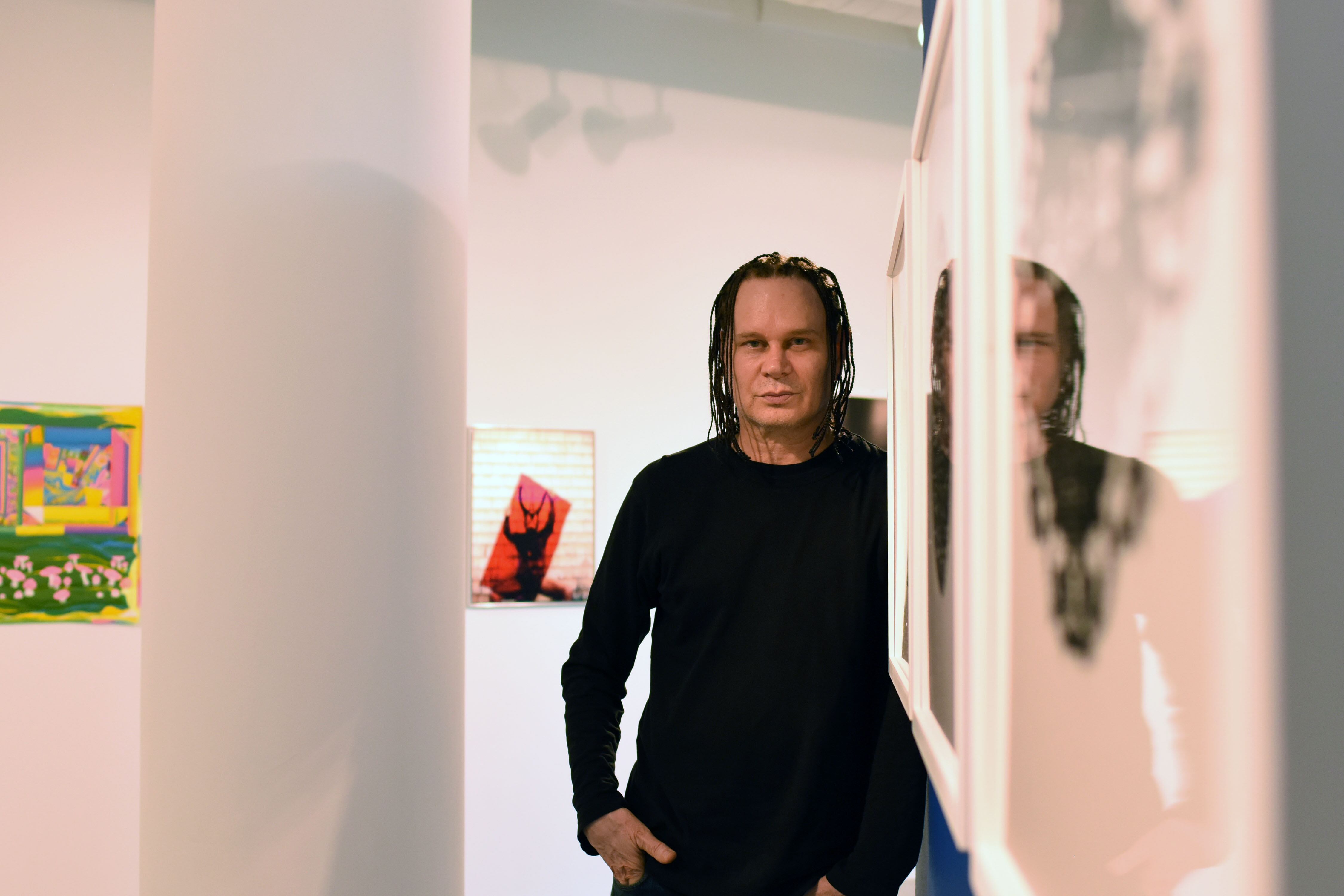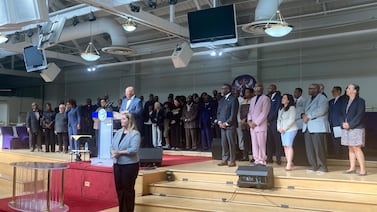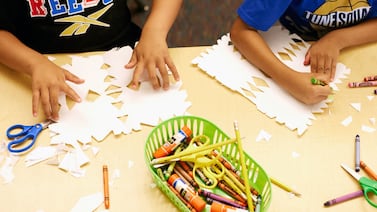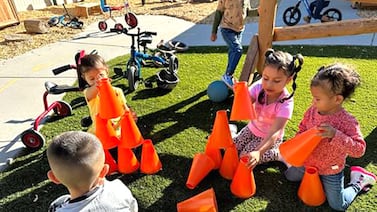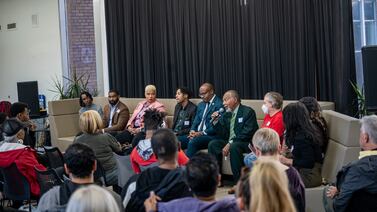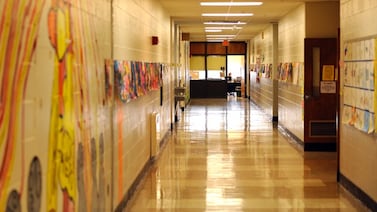Sign up for Chalkbeat Detroit’s free daily newsletter to keep up with the city’s public school system and Michigan education policy.
Growing up in northeast Detroit, Patrick Burton’s androgynous looks meant he was often mistaken for a girl.
One day, a group of boys knocked on the door of the house he and his family had just moved into. They asked his mother if the new girl living there was available. She was confused, but Burton knew they were talking about him.
When the boys met Burton, they were no longer interested in becoming friends. Burton was disappointed but not surprised — he was no stranger to these awkward situations. So, he retreated from the misconceptions, the harassment, the bullying to create his own world, he said, “like many queer people do, right?”
It was a world that was continents away from some of his classmates, filled with art collages from fashion magazines, music from David Bowie, and teachings about the indomitable human spirit from Martin Luther King Jr.
Several decades later, the educator, artist, and curator is still creating his own world — but this one is for his students, too. Burton leads True Colors, an LGBTQ youth group at Denby High School in Detroit where he teaches art.
He started the group roughly five years ago with Denby counselor Sarah O’Halla to ensure it offered support that took advantage of the school’s existing mental health infrastructure. Since then, dozens of students have been part of the group, and it has become a place to embrace their differences, learn about queer culture, and heal.
A Detroit arts educator, still healing, helps his students to heal, too
The decades-long movement for LGBTQ rights has made major progress, including the legalization of gay marriage in 2015. It also has seen a backlash, with a recent wave of anti-trans legislation. Those policies haven’t gained much traction in Michigan, but changing hearts and minds remains a constant struggle, especially for kids of color growing up in Detroit.
That is where True Colors comes in.
Young people attending the bi-monthly group meetings have unwrapped many traumas – from peers who bully or harass them to parents who use homophobic slurs, or even kick them out of the house.
Some of what Burton hears suggests his students are “just as damaged as I was,” he said. For many of them, he believes it will take years to recover. At True Colors, he tries to accelerate that recovery, helping them “put together the broken pieces.”
O’Halla, the counselor who works with Burton, said the group enjoys support from school administrators, and it helps to answer a tremendous need in the school. As many as 40 students have attended a single session. Still, she said “the amount of students that even feel comfortable going is a small fraction of the number of students that would benefit from it.”
The ones who do attend are showing “a huge step of courage,” O’Halla said.
That step usually leads to some important realizations: Through conversation and contemplation, the students learn their situations are not unique and that they are not alone.
Burton also empowers students by teaching them about queer activists who risked everything in the name of human rights. Through films, books, articles, podcasts, and field trips, they learn about people like Harvey Milk, the first gay man to take office in California, writers and thought leaders such as James Baldwin and Audre Lorde, and pivotal events, such as the 1969 Stonewall Uprising, a string of demonstrations that unfolded in New York City after a violent police raid at a gay bar.
This speaks to Burton’s wide breadth of knowledge and his work outside of school as an arts programmer and curator. Burton received a bachelor’s degree in fine arts from School of the Art Institute of Chicago and a master’s degree in liberal studies from University of Detroit Mercy.
He specialized in queer studies for his master’s thesis, writing and directing a performance about the revolutionary roots of drag that debuted at the storied black box theater at 1515 Broadway in Detroit. It was later performed in New York City for the 25th anniversary of the Stonewall Uprising.
Burton continues to be a “queer cultural civil servant” with his organization Mighty Real / Queer Detroit and the multi-gallery, multimedia biennial exhibition, I’ll Be Your Mirror - Reflections of the Contemporary Queer, hanging through the end of Pride month across metro Detroit.
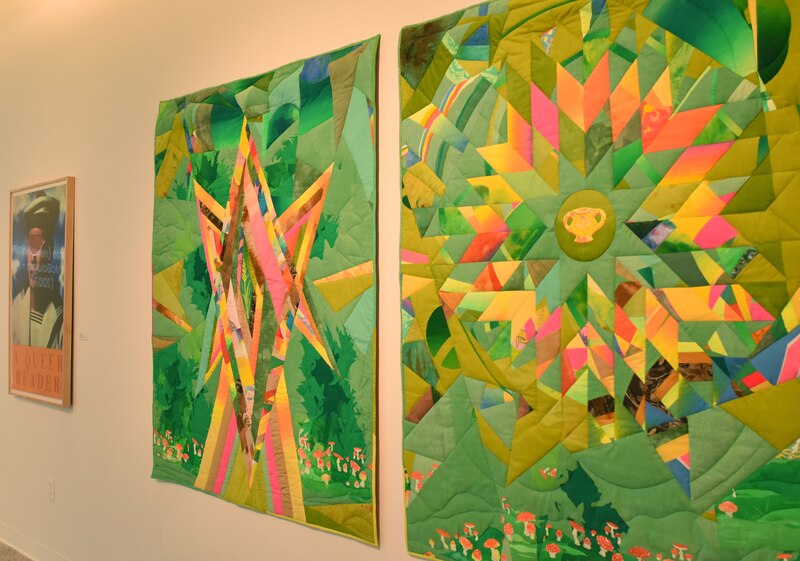
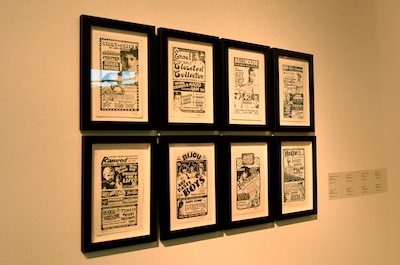
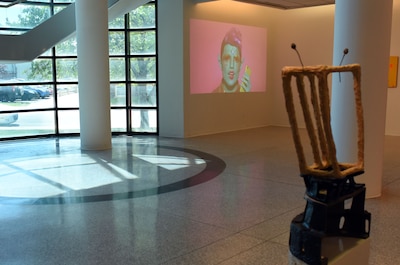
The exhibition elevates queer art, expression, and history with paintings, photography, textiles, videos, and more by dozens of artists from across the world. Every piece has a story tied to queer life, and this approach — illuminating the courageous legacy of LGBTQ culture — mirrors how Burton leads True Colors.
The group is informed by Burton’s raw personal experiences. He came out in the late 1970s and found solace in literature that celebrated difference. In high school, his discovery of Langston Hughes and the Harlem Renaissance marked a turning point. Burton, who is white, felt a strong parallel between notions of “the other,” of being Black in America, with what it means to be queer amid the constant tension of a society ruled by heteronormative standards.
Detroit youth learn to dismantle notions of “the other”
Denby High School senior Arreanna Thompson understands what it means to be the so-called “other,” both as a young Black woman and a queer person. She acknowledges it can be hard for Black queer people to find acceptance given the central role religion plays for many in the Black community.
People outside the queer community have said to her, “‘Oh, you’re supposed to be with a man, get married to a man.’ I just wasn’t feeling that,” she said.
This complicated intersection of race and sexuality crystallized for her when she started having feelings for other girls in middle school.
Thompson is pansexual, meaning she is attracted to people of any gender identity, and she came out to her family rather by accident when she was 15.
She heard her family members say that gay people “should die.” She blurted out, “Well, I like females too. So should I die?”
Thompson said her family told her she did not “deserve to share blood with them,” that her sexuality was a phase – and a choice. She was devastated.
In the True Colors group, which Thompson has attended since she was a freshman, she has felt safe unpacking that painful moment, talking about who she is, and calling on members of the group for support. She also leaned on them when another student harassed and bullied her about her sexuality.
Through Burton’s teachings, she now has a broader understanding of the gay rights movement and its key figures. That has given her courage — this year she attended the city’s annual Motor City Pride celebration for the first time.
“It made me feel safe, like, when you’re at home — like I belonged there. I haven’t felt that way in a long time, that I belong somewhere and that these are my people, this is my community.”
For Rashawn Grayson, who graduated this year from Denby, True Colors will always be a place he can go if he needs support.
Grayson is pansexual, something he realized about himself when he was 10 years old.
“I had a class with a boy and a girl, and I had a crush on both of them,” he remembered. It struck him around the same time how people in his class mocked gay people. He couldn’t understand it. “I was like, ‘But what’s the problem?’”
But Grayson, like most kids, also sought acceptance, so he concealed those feelings and joined in. “When I did that, it kind of felt wrong. But like, I was just in denial when I was that young,” he said.
During his freshman year, as the COVID pandemic tightened its grip on the country, Grayson often found himself alone at home with his thoughts. He became depressed and suicidal. LGBTQ youth are four times as likely to attempt suicide than heterosexual young people.
(If you are struggling, find help and support here.)
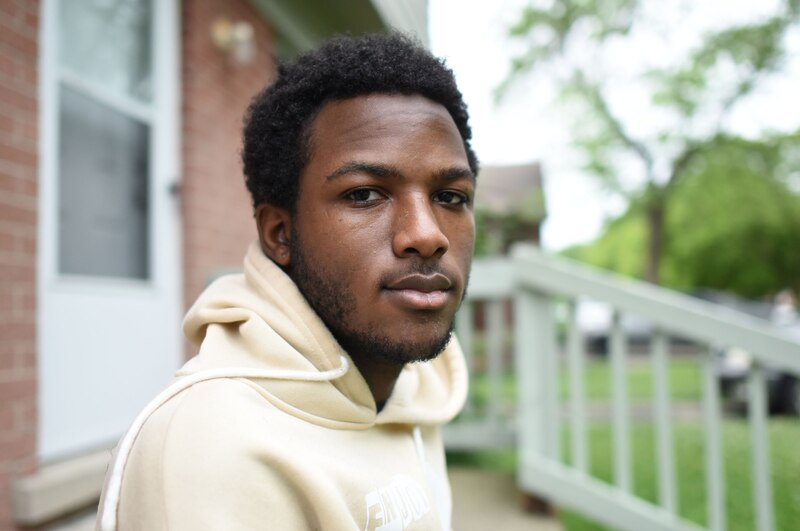
“At that time, I was really coming to terms with who I was,” he said. “And while I was doing that, I was reflecting on all the things I’ve done before, like teasing people, bullying, and all of that.”
He decided he needed to come out to someone.
“I wasn’t going to tell them everything. I was still figuring myself out. But I knew one thing for sure was that I was pansexual,” he said.
Grayson mustered the courage to come out to his mom. Afterwards, she told him she “needed a drink,” because he had just dropped a bombshell on her. They both laughed – but his laughter was forced. Grayson later went to the bathroom and cried.
Joining True Colors helped him come to terms with that moment.
He discovered that he had a community, that other kids also had thorny relationships with their parents after coming out to them. “I stopped caring what people thought about me, or what they said about me. And now, I’m able to constantly tell people that I am a non-gendered person who has three different sexualities.”
Today, Grayson said his mom is still “trying to wrap her head around who I am.” But it is something he can talk about with a certain level of peace.
Just as Burton gathered an empowering vocabulary to describe himself through literature and art decades ago, Grayson, too, has learned a language about his identity through the True Colors group.
“In a way, it has been a form of therapy, not just for me but for everyone in there,” Grayson said.
The biennial exhibition I’ll Be Your Mirror — Reflections of the Contemporary Queer is hanging at galleries throughout metro Detroit through June 30. One participating gallery, Anton Art Center in Mount Clemens, shows pieces from the exhibit through mid-August. Find additional info, updates, and more here.
Robyn Vincent is a reporter for Chalkbeat Detroit, covering Detroit schools and Michigan education policy. You can reach her at rvincent@chalkbeat.org

